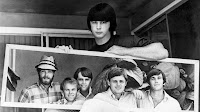Although I was born just a decade after the release of The Beach Boys’ 1962 debut album Surfin’ Safari, their music always felt to me kind of like the playfully distant past, steeped as it is in a carefully cultivated sense of pop nostalgia. Nevertheless, the legendary story and career of Brian Wilson still retain a certain allure for me, and it’s clear why so many other longtime listeners are equally drawn in by his continued trajectory through pop music history. Brent Wilson’s recent documentary Brian Wilson: Long Promised Road presents perhaps the most personal view of Brian Wilson’s contributions to that history, a truly close-up portrait in terms of artistry, musicianship, and emotion, along with insightful analysis and commentary from the likes of Bruce Springsteen, Elton John, Don Was, Linda Perry, Jakob Dylan, and even Nick Jonas (whose own career was launched, just like Wilson’s, in a popular band with his two brothers). The result is a film that’s intimate, moving, and at times heartbreaking in its exploration of Wilson’s art and world.
Brian Wilson’s guide and sidekick throughout the documentary is Rolling Stone writer and editor Jason Fine, whose easygoing and gently calibrated interviewing style helps to relax Wilson’s nerves and allay his anxieties about participating in the film, a very particular sort of skill that Fine has developed since Brian Wilson has been his “beat” at Rolling Stone since 1995. The majority of the documentary shows the two hanging out over a series of interview lunches at the Beverly Glen Deli, and mostly just driving around the streets of Los Angeles with a dashboard camera to revisit key landmarks from Wilson’s past, while talking and listening to music together. The ultimate impression those conversations leave is that Wilson must be among the sweetest musicians on the planet, one whose persona and disposition have been characteristically misunderstood by some throughout his time in the music industry, while also being unrelentingly championed by others who could see and understand the full picture. In examining both Wilson’s music and prominent factors from his upbringing and family, Long Promised Road travels some significant mileage to provide many important details and subtly fill in those gaps.
The aspect of Wilson’s experience that moved me most is just how much he’s survived, and how much loss he’s faced. His brothers Dennis and Carl (his closest Beach Boys bandmates, alongside band members Al Jardine and Mike Love) had both died at relatively early ages, dual tragedies that still register painfully in his eyes when Fine asks about his brothers. Wilson remarks that he wants to hear Dennis’ only solo album released during his lifetime, 1977’s celebrated Pacific Ocean Blue, when they get back to his house because he says that he’s never listened to it before at all, astoundingly, perhaps a willful avoidance of the memories it might dredge up. He sits back and listens intently and excitedly, clearly impressed with the songs as Fine streams them for him on a laptop. Based on Fine’s praise, I went back after watching the film and listened to Dennis’ “River Song,” the album’s opening track, and it’s indeed a fantastic creation that obviously owes a debt to Brian Wilson’s orchestrations of The Beach Boys’ classics in the studio years before.
Similarly, the film’s commentaries by fellow musicians gave me a whole new appreciation for Brian Wilson’s craftsmanship on some of the best songs from The Beach Boys’ catalog: “Good Vibrations” (which I previously had no idea was recorded at four different studios from verse to chorus to verse, but I can definitely hear that element in the song now), “California Girls,” “Long Promised Road,” the endlessly haunting “In My Room,” “Sail On Sailor,” and especially the seminal numbers from 1966’s Pet Sounds like “God Only Knows,” which famed music producer Don Was breaks down into separate vocal and instrumental tracks to demonstrate how ingeniously they’re layered. Bruce Springsteen speaks precisely about how the songs gave Wilson access to “the joyfulness of an emotional life,” which he could then share with listeners. The great singer-songwriter and producer Linda Perry perceptively notes how Brian Wilson’s competitive spirit has kept him in the game all the way up to the present moment, a competition not just with The Beatles’ album Rubber Soul, but mainly with himself. She comments that when she watches Wilson perform today, she sees not age but “fucking history, and continuing to make history.”
That thought returns to the notion of survival. Wilson and Fine openly address Wilson’s history of mental illness and his eventual diagnosis with schizoaffective disorder. Wilson mentions that from his youth onward, he would hear voices in his head taunting him and criticizing him, which seems linked to how his father, who’d managed The Beach Boys early on in their career, would verbally abuse him and often took things too far. For a sensitive artist like Wilson, it’s as though his mind became entrenched in a form of post-traumatic stress in the wake of that intense early criticism that he’d internalized. Wilson was fortunate to meet and marry his second wife Melinda just as his mental health was hitting its lowest point, a relationship that’s consummately recreated by actors John Cusack and Elizabeth Banks in the 2014 Wilson biopic Love & Mercy. Melinda has remained a steadfast partner and loving guardian to Wilson ever since, and the couple have adopted and raised several children together. As Elton John remarks, Wilson deserves as much praise for the integrity of his personal life as he’s received for the brilliance of his music.
After I watched the documentary, I noticed how many film critics online mentioned in their reviews that they found Wilson’s seeming lack of responsiveness to Fine’s interview questions to be “frustrating” because Wilson often simply states (and re-states) plain facts rather than rationalizing. Yet that seems to miss the point of Fine’s intentionally delicate, intuitive approach to interviewing Wilson, an approach that wisely takes the issue of neurodiversity into account. I’d suggest that the important part isn’t just documenting what Wilson says when he responds during interviews with Fine, but rather showing how exactly Wilson responds. For instance, there’s a stunning moment when Fine tells Wilson that Jack Rieley, who’d managed The Beach Boys at one point and also helped to produce their 1973 album Holland, had recently died. Wilson lets it sink in, says he wasn’t aware, asks how Rieley died, and stares ahead blankly. Then we realize that he’s quickly wiping away tears. A minute or two later, he says to Fine that it broke his heart to learn of Jack Rieley’s death, and it’s clear that Wilson is someone whose mind just processes emotions differently, and therefore causes him to express his emotions differently. Earlier in the film, he also tells Fine that it’s been three years since he’s had a friend simply to sit and talk with, and then we know where the profound solitude, insularity, and loneliness at the heart of a song like “In My Room” arises from. I think it’s something that every wonderful musician who still performs with Brian Wilson on stage today seems perfectly aware of, and it’s something that the audiences who enthusiastically embrace his live performances at his concerts know as well. They’re amazed and grateful that he’s still here to create and perform for us despite the difficulties, and Brian Wilson is just as amazed and appreciative that he’s made it through everything, too.
Subscribe to:
Comments (Atom)





